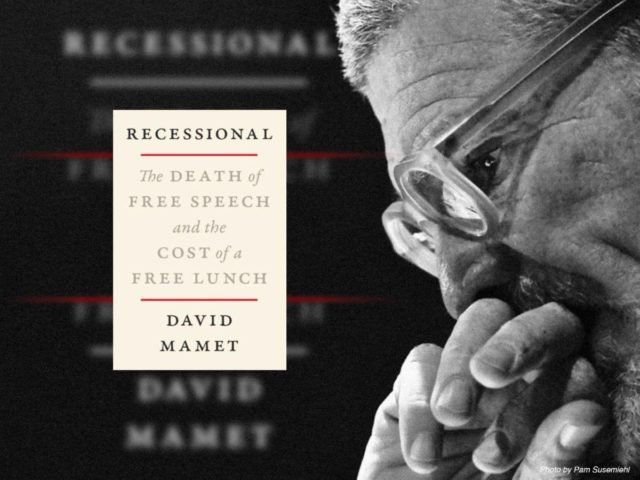
Who: David Mamet, Bari Weiss
What: Livestreamed book discussion
Where: The Temple Emanu-El Streicker Center online
When: Monday, April 11, free with advance RSVP, 7:00 (with option to purchase book)
Why: “President Trump has been calling out the fake news since he declared he’d run. I’m with him there. In fact, an excellent preparation for dealing with blacklisting (my own) is a career as a playwright. The science of history burgeoned with the invention of movable type; it is now dying through the application of ink eradicator known as ‘the media.’ Soon it will be no more.”
So writes David Mamet in his latest book, Recessional: The Death of Free Speech and the Cost of a Free Lunch (HarperCollins, $28.99, April 2022), in which he pulls no punches about the sorry state of our world. In such chapters as “The Fountain Pen,” “Cause and Effect,” “Reds, Pinks, and Goo-Goos,” and “What’s in a Name,” Mamet delves into religion, politics, the social contract, and his personal life, unpredictably skewering all sides as only he can. For more than fifty years, the Chicago-born Pulitzer Prize winner has been challenging us in such plays as American Buffalo, Glengarry Glen Ross, Speed-the-Plow, and Oleanna, such films as House of Games, The Spanish Prisoner, Things Change, and State and Main, and such books as Bambi vs. Godzilla: On the Nature, Purpose, and Practice of the Movie Business; The Secret Knowledge: On the Dismantling of American Culture; and The Wicked Son: Anti-Semitism, Jewish Self-hatred, and the Jews.
He will be launching Recessional with a free livestreamed event on April 11 hosted by the Temple Emanu-El Streicker Center, moderated by Bari Weiss, the journalist and author of How to Fight Anti-Semitism and The New Seven Dirty Words who famously resigned from the New York Times, explaining, “The lessons that ought to have followed the election — lessons about the importance of understanding other Americans, the necessity of resisting tribalism, and the centrality of the free exchange of ideas to a democratic society — have not been learned. Instead, a new consensus has emerged in the press, but perhaps especially at this paper: that truth isn’t a process of collective discovery, but an orthodoxy already known to an enlightened few whose job is to inform everyone else.” Get ready for a lively conversation that is likely to both enlighten and infuriate but never bore you.